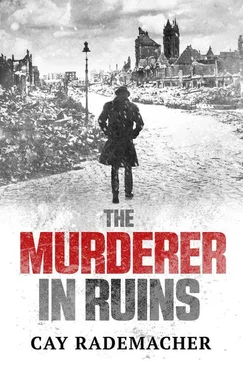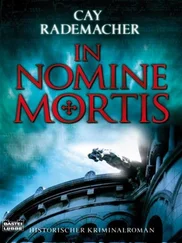Cay Rademacher - The Murderer in Ruins
Здесь есть возможность читать онлайн «Cay Rademacher - The Murderer in Ruins» весь текст электронной книги совершенно бесплатно (целиком полную версию без сокращений). В некоторых случаях можно слушать аудио, скачать через торрент в формате fb2 и присутствует краткое содержание. Год выпуска: 2015, ISBN: 2015, Издательство: Arcadia Books Limited, Жанр: Триллер, на английском языке. Описание произведения, (предисловие) а так же отзывы посетителей доступны на портале библиотеки ЛибКат.
- Название:The Murderer in Ruins
- Автор:
- Издательство:Arcadia Books Limited
- Жанр:
- Год:2015
- ISBN:9781910050750
- Рейтинг книги:5 / 5. Голосов: 1
-
Избранное:Добавить в избранное
- Отзывы:
-
Ваша оценка:
- 100
- 1
- 2
- 3
- 4
- 5
The Murderer in Ruins: краткое содержание, описание и аннотация
Предлагаем к чтению аннотацию, описание, краткое содержание или предисловие (зависит от того, что написал сам автор книги «The Murderer in Ruins»). Если вы не нашли необходимую информацию о книге — напишите в комментариях, мы постараемся отыскать её.
The Murderer in Ruins — читать онлайн бесплатно полную книгу (весь текст) целиком
Ниже представлен текст книги, разбитый по страницам. Система сохранения места последней прочитанной страницы, позволяет с удобством читать онлайн бесплатно книгу «The Murderer in Ruins», без необходимости каждый раз заново искать на чём Вы остановились. Поставьте закладку, и сможете в любой момент перейти на страницу, на которой закончили чтение.
Интервал:
Закладка:
MacDonald looked confused. Maschke’s face had gone the same colour of grey that army recruits used to go when they got their orders for the eastern front a few years back.
The Girl with No Name
Saturday, 2 February 1947
His left leg hurt. Since early morning Stave had been plodding up and down the station platforms like a nervous sheepdog. It was now coming up to midday. Every half-hour a train would arrive, pulled by battered steam locomotives belching black sooty clouds, with a whistle and screech of iron wheels on iron rails.
Most of them were either carrying potatoes in from the countryside, open-topped freight trains or standing-room-only trains, former third-class carriages with the seats ripped out in order to squeeze more people in. Men in suits or overalls piled out, young women so weak they could hardly walk, in headscarves, or just old curtains wrapped around their heads and necks to protect them against the lethal wind that blew through the carriages. You could only see their eyes. Some were carrying cardboard boxes in their hands or net shopping bags, ripped rucksacks or bags cobbled together out of strips of torn canvas, people who’d been out foraging in Luneburg or Holstein, buying potatoes. The farmers out there were getting rich. People would offer their last valuables, the family silver, gold coins, stamp collections, old paintings, smuggled Wehrmacht weaponry. They would even beg.
Most came back with just a few pounds of potatoes, some with nothing at all. Several of them were bleeding from ragged wounds to their arms, thighs or buttocks, visible beneath their ripped clothing: some of the farmers got so fed up with the begging, they set dogs on them.
‘Hamsters’ was the popular name for them, but to the police it was officially ‘direct producer-consumer trade’, and it was illegal. It went against the rules of the emergency economy, sabotaged the ration system. British military police and uniformed German police kept watch at stations outside the city, and would occasionally close down the main station to carry out a raid. More than one ‘hamster’ who’d spent two days begging in the countryside and in the end handed over his gold watch for four pounds of potatoes would find himself robbed of them when he got back and thrown into jail.
Stave wasn’t interested in the ‘hamsters’; they weren’t why he was here. He was watching the emaciated figures in Wehrmacht greatcoats. Could his son have become one of these wraiths? Would he even recognise him? The chief inspector watched the returning veterans as they stood there on the platform, still confused, getting their bearings once again. Then he would go up to them, speak to some of them, offer them cigarettes. It was the same ritual every time, the same brief surge of hope, like the effect of a glass of schnapps in the bloodstream. And then the same empty faces, the mumbled regrets, sometimes confused, even crazy, answers. Karl Stave? Never heard of him.
‘Can I help warm you up?’
Stave spun round in surprise. A girl, just 12 years old, Stave reckoned, though her emaciated figure might be deceptive; she might be 14. He shook his head, about to turn round again, then hesitated, put his hand in his pocket and gave the kid two cigarettes.
‘Maybe these’ll do you some good. Keep you out of the hands of a pimp.’
The girl snatched the cigarettes, shouted, ‘Don’t be so fucking sentimental,’ and vanished.
The next train was on platform four, from the Ruhr, not from the east, but Stave didn’t want to miss any of them. There were two former soldiers on the wooden walkway from the platform, and in front of them two British military policemen. With trembling hands the two ex-POWs showed them their release papers. Stave waited until they had been checked.
A hand on his sleeve.
The chief inspector spun round, expecting to see the skinny girl again. But it was Maschke.
‘At last,’ the vice squad officer said, before a smoker’s cough wracked him. ‘I’ve been looking for you for an hour,’ he managed to croak out.
Stave closed his eyes wearily. ‘Not another murder?’
‘Maybe.’
‘What do you mean, maybe ? Is it a murder or isn’t it?’
‘It’s a murder but it’s not clear if it’s the killer we’re after.’
‘Why not?’ asked Stave, glancing back at the two ex-POWs, then following Maschke who was already striding forcefully towards the main exit.
‘In this case too, the victim was strangled by a thin wire,’ his colleague said, hesitatingly, ‘but this time it’s a child.’
The patrol car was standing outside the former Deutsches Schauspielhaus theatre, now renamed the Garrison Theatre and reserved for the British. Maschke carefully settled back in the driver’s seat, turned round, glanced in the mirror and then edged the old Mercedes ever so carefully away from the curb. When he saw how nervous Stave looked, he smiled apologetically.
‘I learnt to drive in the Wehrmacht, in one of the VW Kubelwagen bucket-seat jeeps on the broad French allees . They were a lot more basic than this grand old lady. I don’t want to get any dents.’
‘We’re in no hurry,’ Stave replied.
Maschke coughed. ‘We’re going to Hammerbrook. It’s not far. Bill Strasse.’
Stave closed his eyes. In the east of the city again, another working-class district that had been heavily bombed, razed to the ground more than any other part of the city.
‘Nobody lives there any more,’ he muttered.
‘The body was found in the lift shaft of a former mattress factory, 103 Bill Strasse, out by the mouth of the Northern Elbe, at the end of the port.’
‘Who found it?’
‘A ship’s watchman, who’d been walking along the canal. Probably looking for coal. You sometimes find bits dropped from a load. Said he was just taking a walk. The report came in about 10.30 a.m.’
‘Have you already checked him out?’
Maschke shrugged. ‘Says he was in Lubeck with his mother up until yesterday. We’re checking that out. If it’s true he can’t be a suspect. If it’s not true then he’s got a problem.’
Maschke drove the heavy old car carefully down the empty streets, making wide detours around the heaps of rubble, but swerved to the side of the road when faced with oncoming British jeeps, avoiding them as if they were tanks. It was about five kilometres from the station to the spot in Hammerbrook where the body had been found, Stave reckoned. It would have been faster walking than with Maschke driving. But at least he didn’t have to face the icy wind.
They passed endless rows of charred facades with no windows, like stage sets in some gigantic burnt-out theatre. The steel structures of the elevated railway, its tracks and bridges, bore the scars of bomb impacts; collapsed in places, bent into grotesque sculptures or reduced to tiny red-black lumps by the ocean of flames that had engulfed them.
The Mercedes rumbled a kilometre or so along Bill Strasse to where a facade that had collapsed on to the street blocked their way. Maschke parked next to the rubble behind a British jeep and the crime scene team’s vehicle.
As Stave stepped out of the car he almost trod on a wooden cross at the foot of the heap of rubble, nailed together at an angle and with the words ‘To our Mother Meta Kruger 27/28.7.1943’. He imagined she was still lying under the rubble, and turned his face away.
They had some 200 metres to walk through the rubble, the meterthick ice on the Bille canal glistening to their right. Somewhere or other the wind was being sucked through a burst stovepipe, making a noise like an eerie organ. There was nothing living visible anywhere, not even a rat or a crow. Stave had climbed around a partially intact wall before he came across signs of life: uniformed police and figures in long overcoats with caps pulled down low over their eyes. British military.
Читать дальшеИнтервал:
Закладка:
Похожие книги на «The Murderer in Ruins»
Представляем Вашему вниманию похожие книги на «The Murderer in Ruins» списком для выбора. Мы отобрали схожую по названию и смыслу литературу в надежде предоставить читателям больше вариантов отыскать новые, интересные, ещё непрочитанные произведения.
Обсуждение, отзывы о книге «The Murderer in Ruins» и просто собственные мнения читателей. Оставьте ваши комментарии, напишите, что Вы думаете о произведении, его смысле или главных героях. Укажите что конкретно понравилось, а что нет, и почему Вы так считаете.











